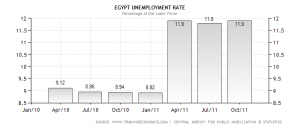From one the first days of protests in Egypt January 25st 2011 in Tahrir Square, it was more than apparent change was coming. Over a year after 30-year reigning President Hosni Mubarak stepped down, who knew lasting changes would feel so… slow? Parliament was dissolved, the constitution was suspended, and the Armed Forces of Egypt assumed power. But according to Esraa Abdel Fattah the “Facebook Girl”, the “Mubarak regime” lingers and life is not better in the country compared to last year (Staff 2011).
While fair elections were held, the Muslim Brotherhood came out on top of the elections. As this replacement parliament works on drafting a new constitution, violence against peaceful protests and conflicts continue in the streets. Unrest at this point is waiting to be sparked by anything; one such flicker is due to ruling generals (Scaf) unwilling to surrender power. The balance of power in Egypt may leave many citizens, especially women between a rock and a hard place. The presence of the Muslim Brotherhood will keep a dominating Islamic residual meaning that state will still favor religious influence and the two will not be separated. On the other hand, military control as experienced for nearly ten months after Mubarak was forced to resign his position became an evil at the behest of “supra-constitutional principles” putting military control before civilian politics (Staff 2011).
Since these protests, over-takings, disbandings, and violence are not unique to Egypt as the macro economic effect of the Arab Spring on the region has been very noticeable. Egypt’s GDP in mid-2011 was expected to see a 2.5% fall, in addition to Tunisia, Syria, and Yemen GDP contractions (Martin 2011). The only country expected to have expanding GDP growth was Bahrain with a 2.5% increase, its slowest pace of growth since the 1990’s (Martin 2011).
The biggest hit on any of Egypt’s sectors is to tourism, which accounted for 6% of GDP in 2010. More importantly, this sector accounts for between 10 and 15% of employment in the labor force (AFP 2012). Due to violence, protests, and fear, tourism has seen significant decreases in visitor arrivals (down 33%), duration of time spent in Egypt (down 23% from 141 million nights in 2010 to 114 million in 2011), and dollars spent per day while visiting (down to $72 per day compared to $85 in 2010) (AFP 2012).
This hit to the tourism sector has been a part of the significant increase in unemployment over the past year. Beginning January at about 9% unemployment in October 2011 has been measured at 11.9% (www.tradingeconomics.com 2011). What I believe is not represented in any of this data is the unemployment of day workers in these major cities, lower class citizens that receive unmeasured benefits from high levels of tourism for various reasons.
Egypt’s deficit was expected to be 12.5% of GDP in 2011, and expected value of the Egyptian pound to decrease by 20%.
This inflation has been addressed by the Central Bank of Egypt, which stepped in and used significant reserves to prop up the value of the pound, rather than let it fall to its real value (Salah-Ahmed and Daily News Egypt 2012). While the allocation of reserves has been denied by some; it may be a smart (short-term) move in order to keep relative prices from rising too quickly. As long as inflation is still occurring, steep increases will lead to shoeleather costs from reduction in individual daily cash holding, as well as menu costs that can affect the variability of relative prices in the long run and create inefficient allocations of resources.
While it will undoubtedly take a long time to regain a stable economic environment, the most significant help will come from an established and widely supported government.
